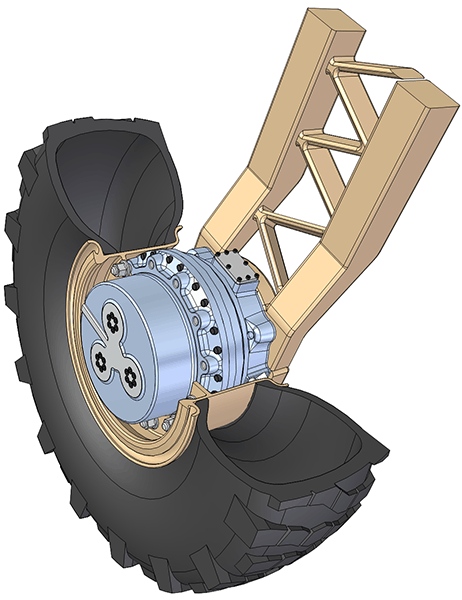The Farnborough-based company will apply its electric hub-drive technology in the Ground X-Vehicle Technologies (GXV-T) programme, an initiative launched by US Defense Advanced Research Projects Agency (DARPA) in August 2014.
Qinetiq’s hub-drive replaces multiple gearboxes, differentials, and drive shafts with compact, high-powered electric motors contained within wheels. The company said that this approach reduces overall weight of the vehicle and introduces new design possibilities that improve safety and increase performance for military and civilian vehicles.
The technology also has the potential to enhance current military vehicles, such as multiple-wheeled infantry vehicles that could be retrofitted with the hub-drive system to exploit the extra power and agility that comes with reduced weight, or use the saving to offset extra armour, equipment, or personnel.

Current armoured vehicles face ordnance that is increasingly effective at penetrating them, but and adding extra armour incurs penalties in terms of vehicle speed, mobility, and increased development and deployment costs.
Similarly, conventional drive systems can become lethal projectiles when an explosion occurs beneath the vehicle.
Dr David Moore, director of Research Services at Qinetiq, said: “Moving the drive system to within the wheels removes this threat and disrupts the trend of vehicles becoming heavier and less mobile due to increasing protection and weaponry.”
The latest $2.7m investment, awarded in July 2016, will take the technology from a concept design into the building and testing phase, including production of two fully working units.
Qinetiq is also looking at opportunities to introduce similar hub-drive systems into commercial sectors such as transport, agriculture, mining, and construction.
“The system could be scaled up or down for use on any number of vehicles, from dump trucks to space rovers,” Dr Moore said. “The benefits of enhanced power, high torque, efficiency, and agility are not limited to military vehicles, so we are keen to explore opportunities to use this technology in new and innovative ways.”











Guest blog: exploring opportunities for hydrogen combustion engines
"We wouldn't need to pillage the environment for the rare metals for batteries, magnets, or catalisers". Batteries don't use rare...